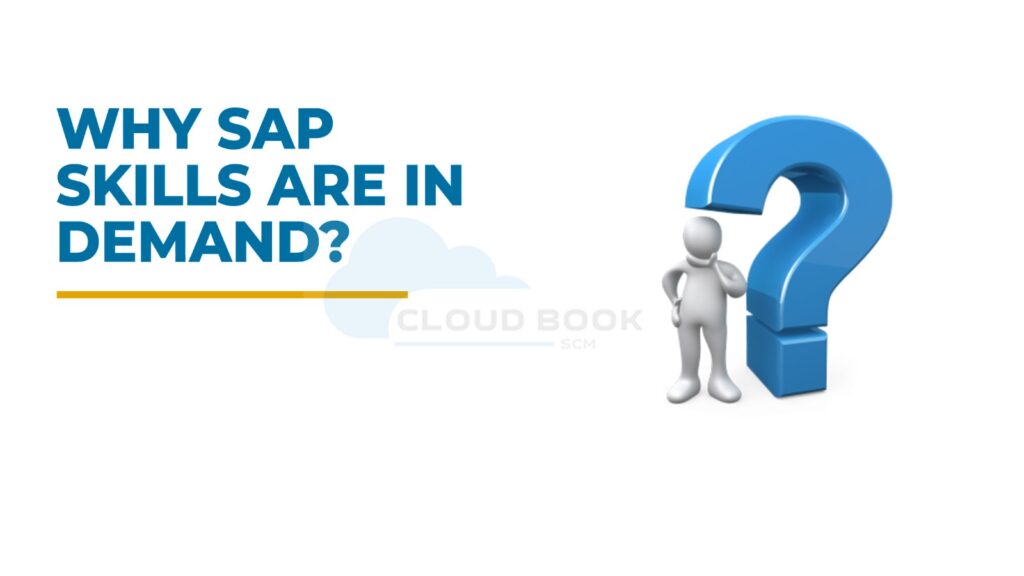The business landscape is constantly evolving, and technology plays an important role in helping organisations stay competitive. SAP has emerged as a powerful tool in this digital transformation journey. It is an enterprise software solution that enables businesses to effectively manage their operations, finances, and customer relations. Due to its immense value, professionals with expertise in SAP are highly sought after across industries. In this blog post, we will explain the reasons why SAP skills are in demand, how they are essential for the future of business, and how individuals can seize the opportunity to benefit from this growing demand.
The Changing Face Of Business
The changing face of business is evident in the rapid advancements in technology. As organisations strive to adapt and transform their operations, the demand for professionals with SAP skills is skyrocketing. With the rise of e-commerce, cloud computing, and data analytics, businesses are increasingly relying on SAP to optimise their processes and gain a competitive edge. SAP offers a comprehensive suite of applications that integrate various business functions, enabling companies to streamline operations, make data-driven decisions, and provide exceptional customer experiences. As businesses embrace digital transformation, professionals with SAP expertise will play a vital role in driving innovation and growth. In the next section, we will delve deeper into the specific benefits of SAP skills and explore the diverse range of industries that need SAP professionals.
Why Do Companies Implement SAP Systems?

In today’s modern business landscape, many organisations face the challenge of operating with multiple software solutions that lack integration and hinder seamless collaboration. This obstacle often prevents companies from creating a unified business ecosystem that fully meets their needs. Recent research indicates that enterprises use an average of 976 applications, but only 28% of these are effectively integrated. Notably, 38% of companies identify the lack of integration among siloed business software tools as the primary roadblock to achieving digital transformation.
Despite these challenges, there is a promising solution on the horizon. By implementing a comprehensive ERP solution or integrating SAP into various business operations, organisations can confront these obstacles head-on. This approach allows for the centralization and streamlining of processes, leading to increased efficiency and optimization of overall performance. With this forward-thinking strategy in place, businesses can look forward to a more interconnected and prosperous future.
So, what exactly is SAP? In simple terms, SAP is an enterprise resource planning software designed to streamline and optimise business processes. With hundreds of fully integrated modules covering every aspect of business management, SAP offers a centralized system that allows different departments to access and share data seamlessly. This level of integration creates a harmonious work environment where employees can collaborate efficiently.
With its robust capabilities, using SAP brings numerous advantages to businesses. First and foremost, it enhances productivity by automating manual tasks and providing real-time insights into operations. This enables companies to make data-driven decisions promptly, leading to improved efficiency and profitability. Moreover, SAP offers unparalleled scalability and flexibility. As businesses evolve and grow, they need reliable tools that can adapt accordingly. With its modular structure, SAP allows organisations to select specific modules that align with their unique needs while still maintaining the ability to integrate additional modules as their requirements change over time.
Let’s consider the example of a product manufacturer to understand how SAP works and the benefits it can bring.

In the logistics field, various functions need to be carried out, such as material management, customer services, and sales and distribution. Typically, these functions are handled by different departments within the organisation. However, effective communication and integration of data across all departments is crucial for making informed business decisions.
By implementing an SAP solution that integrates all of these important functions, accessing necessary data becomes effortless. Once all features are successfully implemented, decision-making becomes streamlined and leads to a multitude of benefits:
- The implementation of a single integrated platform significantly reduces the total cost of ownership (TCO) for businesses.
- Businesses receive full support from applications throughout their operations.
- With fewer stock outages, businesses experience reduced loss of sales and increased revenue.
- Materials purchasing becomes more efficient and reliable, resulting in cost-savings and fewer production delays.
- Enhanced customer satisfaction is achieved through reduced product delivery delays.
- Distribution and freight costs are decreased, allowing for greater efficiency in transportation.
With SAP at the core of operations, businesses can expect improved productivity, cost savings, and overall success.
What Solutions Does SAP Offer?
SAP offers a wide range of solutions to address the challenges faced by different businesses. Each module within the SAP system focuses on specific business operations, ensuring that companies can find the right solution for their needs.
In addition to the standard module package, which includes Enterprise Resource Planning, CRM for Sales and Marketing, Sales and Distribution, Financial Management, Human Resources, Asset Management, Product Lifecycle Management, and Supply Chain Management, add-on solutions are available for customisation.
One of the key advantages of SAP is its ability to provide industry-specific solutions. Whether it’s in manufacturing, pharmaceuticals, healthcare, IT, insurance, security, finance or other sectors, SAP offers tailored solutions that meet the unique requirements of each industry. This flexibility allows businesses to choose only the modules that are relevant to them and create a customised SAP experience that aligns with their specific needs.
Advantages Of Using SAP
Centralized Data Hub: SAP consolidates data across departments, promoting seamless information sharing. Departments like sales, finance, and HR access information in one location, reducing errors and improving overall efficiency.
Automated Workflows: SAP streamlines processes like account and order management, automating data flow based on predefined guidelines. This automation frees employees to focus on more impactful tasks, boosting organisational efficiency.
Visualization: SAP offers reports and dashboards that present important data in an easy-to-understand format in real-time. This visual representation, such as graphs and charts, simplifies decision-making and enhances understanding of processes and related issues.
Cloud Solutions: SAP offers a versatile Cloud Solution alongside on-premise options, providing accessibility, scalability, and adaptability for businesses. The cloud approach enables seamless integration, optimal performance, and easy updates, reducing the workload on internal IT teams. Leveraging cutting-edge technologies and data analytics, SAP’s cloud solution empowers businesses to stay competitive and drive continuous improvement in a dynamic business landscape.
Flexible Accessibility: SAP offers versatile deployment options, on-premise or through the cloud, supporting businesses of all sizes. Mobile applications ensure accessibility from anywhere, with top-notch security measures ensuring data confidentiality, even on mobile devices.
Globalization: SAP supports multiple geographical locations and currencies, making it a valuable tool for companies with international operations.
Revenue Growth: By improving efficiency, freeing up employees to focus on critical tasks, and providing a comprehensive view of operations, SAP helps increase overall revenue and profits for organisations.
Who Uses SAP And What The Statistics Reveal
According to the 2018 SAP Corporate Fact Sheet, the adoption of SAP solutions by global companies is truly remarkable. 99 out of the top 100 largest global companies rely on SAP solutions for their operations. The impact of these solutions goes beyond just large enterprises; in fact, around 80% of SAP users are small and medium-sized businesses.
The use of SAP software has proven to be incredibly beneficial for businesses worldwide. Not only does it lead to greater efficiency and streamlined operations, but it also enables better business decisions to be made. These advantages directly contribute to a company’s bottom line and overall success.
It’s impressive to see how much influence and trust businesses have placed in SAP solutions. With such widespread adoption and proven benefits, the future looks bright for both large corporations and smaller enterprises leveraging the power of SAP software.
In a recent interview, Kulmeet Bawa, the president and managing director of SAP in the Indian subcontinent, shared some insights on the rapid growth of the company.
“It’s been a very exciting 25 years for SAP because while the Indian economy has grown about 10x in the last 25 years, today, we end up touching more than 60 per cent of India’s GDP, just through SAP and its partner ecosystem. I call it the nation-building story for us,”
He highlighted SAP’s progress as a cloud company and discussed the opportunities and challenges that lie ahead. Despite these challenges, Bawa remains optimistic about SAP’s future and is confident in their ability to continue driving growth and innovation in the industry. With a strategic focus on the cloud, SAP is well-positioned to capture new opportunities and deliver value to its customers. Bawa’s positive outlook reflects the company’s determination to stay at the forefront of technological advancements and provide cutting-edge solutions for businesses across various sectors.
Why SAP Courses And SAP Certification
There are numerous advantages to pursuing a SAP certification. A SAP expert is highly sought after worldwide due to their extensive knowledge, expertise, and skills in the field. By undertaking a SAP course, you can experience a range of benefits:
1. Increased Job Opportunities: Companies across various industries value individuals with SAP certification, opening up a multitude of job prospects in both management and IT sectors. Whether it’s government organisations, private entities, consultancies, or logistics and manufacturing industries, there is a high demand for SAP consultants.
2. Lucrative Salaries: Those who hold SAP certification often receive higher salaries compared to their non-certified counterparts. Salary increments can be correlated with advanced levels of certification along with factors like work experience, educational background, and skill sets.
3. Positive Reputation Building: Possessing SAP certification can lead to better job roles, increased salaries, and recognition from both clients and colleagues alike. Certified professionals are often regarded as knowledgeable and analytical individuals, fostering a positive reputation within the IT industry.
4. Special Recognition: Research indicates that SAP-certified specialists have a higher approval rate in the job market when compared to non-certified experts. Employers acknowledge and appreciate the value that certified professionals bring to their organisation.
5. Career Advancement Opportunities: Obtaining a SAP certification gives you a competitive edge, enabling faster career advancement and promotions. Certified individuals are more likely to climb the organisational hierarchy swiftly due to their specialised knowledge and expertise in SAP.

If you’re eager to elevate your career and boost your CV, SAP training and certification is the perfect choice. With a diverse array of modules to explore, SAP provides extensive training that will equip you with the necessary skills for success. Whether your passion lies in finance, logistics, or any other field, there are over a hundred certifications available for you to choose from. While some modules may be free of charge, others may require an investment. However, by selecting the certification that aligns with your desired career path, you’ll be well on your way to achieving remarkable success in the dynamic world of SAP.
Check out our guide on “Unlocking Success: A Guide On How To Crack SAP Certification.” We believe that with the right guidance and determination, anyone can achieve success in obtaining their SAP certification. Our comprehensive guide will provide you with all the tips and strategies you need to excel in your certification journey.
Get ready to unlock your full potential and embark on a path towards professional growth and achievement with SCM-Cloudbook.

